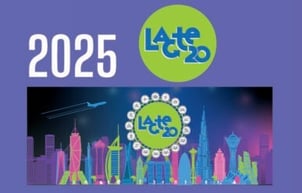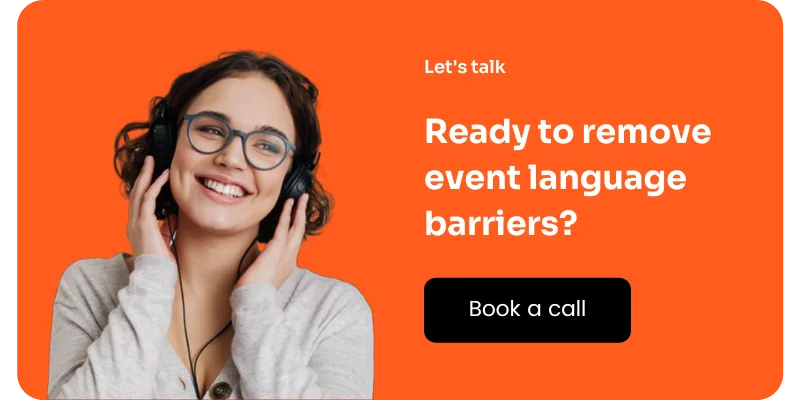With more events move online, event organisers and managers of traditionally “offline” events are coming to realise that the landscape is much different.
The fundamentals remain unchanged, but the challenge now is using modern digital technologies to deliver event experiences that are different from the rest.
For those unfamiliar with hosting multilingual events online, knowing just how to make their events stand out is a real sticking point – but it’s here that we can perhaps provide some guidance.
In this blog, we’re going to share several things you can do to make your online multilingual events stand out from the competition.
Online event idea #1: Select the right technology
While technology has always played a critical role in the success of events, never has it been more important to choose it correctly. With events moving online, there are a host of things that businesses must consider before selecting a platform: language support, cloud-based connectivity, resilience… the list goes on!
These businesses must also take into account that events are increasingly international – findings in our Event Management Trends 2020 report show that almost two-thirds (64%) of the event managers we spoke to (106) agreed that events are far more diverse than they were 5 years ago!
As such, ensuring that attendees can listen to event content in their language of choice is key. With offline barriers to entry now removed, events are much more accessible to larger, remote audiences, and these audiences expect the option to interact with speakers and other attendees in new ways (more than three-quarters (78%) of event managers highlighted this is the case).
To capitalise on this opportunity, event organisers must be able to offer their content, and in real time, in a variety of different languages. This requires real-time remote simultaneous interpretation (RSI).
Most conventional platforms don’t have this functionality as standard or provide “limited” support, either in the format of text-to-speech translation, to date with limited translation accuracy, or transcripts. Subsequently, when it comes to delivering an amazing event experience, these platforms fall short as attendees must wait to read an inaccurate translation of the content in their language of choice or download the transcripts after the event has finished.
Those that offer RSI, however (or can be integrated with an RSI platform), ensure that content can be, via an interpreter, delivered in the attendees’ language(s) of choice. This means the experience is consistent, engaging (as attendees listen in their language) and accessible.
Want to really make your multilingual online event stand out?
Pro tip #1
Get some music playing in the background and allow online attendees to converse with each other in chat rooms for specific topic areas you’re due to discuss. This could be 15 or 30 minutes before the opening speech and attendees could be issued a reminder to join the main room 5 minutes before things kick off!
Online event idea #2: Personalise, personalise, personalise!
Personalisation technology enables organisers to provide attendees with tailored recommendations and content to make the event more appealing, improving the overall experience. For example, during registration would-be attendees fill in a form and answer a few questions, i.e. “what content would you most be interested in”, “what kind of event sessions do you enjoy the most”. This information is then used by the personalisation technology to provide suggestions on speaker sessions or direct sign-ups to content they might find useful.
Another piece of technology worth considering for a multilingual online event is matchmaking technology. Matchmaking applications group people together based on the content they are interested in – either before and/or during an event – ensuring people get the content they want to see. These applications often come with chat capabilities, so these groups can communicate with each other and share what they’ve learnt.
If you want to take your online multilingual events to the next level, it’s worth looking at platforms like ON24.
ON24 is designed to deliver always-on and personalised experiences during online multilingual events. It has a suite of personalisation tools that can help you drive engagement at scale – from before people sign up to when they’re attending your online event.
Want to really make your multilingual online event stand out?
Pro tip #2
Create an immersive environment. Some companies, such as VII Events, have created virtual 3D venues that attendees can walk through, room-to-room and engage with presentations and other attendees. If it’s not outside of your budget, it may be worth considering!
Online event idea #3: Reduce friction wherever you can
Whatever platform you choose, it needs to reduce friction. For example, some online events platforms can only support one or two sessions at once. It’s only after these sessions have concluded that others can take place, and often the speaker has to click out of their slides to bring another presenter in. It’s just not seamless enough.
Ideally, you want a platform that can provide multiple “rooms” for different seminars/speaking sessions to take place. There should also be separate language channels within these rooms so that attendees can listen to the content in their language of choice as the presentation is going on.
The other benefit of this capability is that attendees can effectively pick and choose the content they want to listen to.
Check out our guide to getting the most out of virtual conference platforms to see what you need.
Want to really make your multilingual online event stand out?
Pro tip #3
Give attendees a chance to stretch their legs and network with others directly through your platform. Make it so there are “break rooms” attendees can connect to and sit idle in or connect with others in attendance. It’s also worth considering running intermission videos – i.e. behind-the-scenes footage, entertainment, how you’ve planned the event, bloopers, brief interviews with some of the speakers and the like. These are great ways to break up your event!
Online event idea #4: Advertise it well in advance
Just as you would with an offline event, your multilingual online events need to be advertised well in advance if you want to maximise attendance.
Start by pinpointing your ideal audience and tailoring your messages for them. What is it that your event provides that’s useful for them? How can your content help? By positioning your messaging this way, you encourage people to sign up as they don’t want to miss out on anything useful and lose traction against their competition!
Once you’ve crafted your messages and got people to sign up, use email marketing to send out regular newsletters months in advance on a two-week basis. This will not only build “hype” around your event but also increase new sign-ups and provide registrants with more interesting content (which they will most likely share with others).
You can also leverage social media to reach new audiences. Creating unique hashtags and asking registrants to use those hashtags and share your content will improve the visibility of your event and help you to reach new audiences.
Also, make it abundantly clear that your event will be delivered in multiple languages at the earliest opportunity. This is crucial because if someone is interested in an event and sees that it will be delivered in their language, the chances of them signing up increase astronomically.
Lastly, consider using email automation to help you create templates that allow you to send these emails at scale. Automation will allow you to focus on activities that add value to the overall experience, i.e. personalised outreach, developing your member’s only content, working on matchmaking, connecting via social media platforms and much more.
Want to really make your multilingual online event stand out?
Pro tip #4
Start a forum or online discussion area where all your attendees can go to communicate with you, speakers and other attendees. Think of it as a community knowledge base that’s constantly evolving. The best part is that it remains useful even after the event has finished: use it to host recordings, share updates on other upcoming events and answer questions.
Online event idea #5: Provide “unique” content to registrants
One of the best ways to maintain the hype around your event and make it stand out is to have “members-only” content – content that can’t be found elsewhere and gives insight into what your event will cover.
People hate missing out on things that are relevant to their interests, so members-only content can persuade those who have yet to sign up to pull the trigger. Just make sure you lock this content behind a portal (it could even be password protected) so that people have to sign up to see and receive it.
As for what content you should create, well, create content that focuses on what will be discussed at the event and provide information on the speakers themselves. For example, you could do a quick breakdown of one of the topics a speaker at your event is going to cover, or even a quick interview with one of them to share their story and expertise.
Want to really make your multilingual online event stand out?
Pro tip #5
Gamification! If you want to get even more attendees through the door, run mini events with prizes (i.e. discounts on tickets, special access to behind-the-scenes footage or even a chance to speak to one of the speakers one-on-one). For example, you could ask attendees to use your hashtag #inserteventname here on LinkedIn and Twitter to participate and then select one at random to award one of the prizes. It requires little effort by both parties but really adds an interesting element to your event! Another thing you could do is have gamification within your events – ask breakout session speakers to add interactive components to their talks where attendees can draw on whiteboards or present their thoughts on the topic. These are just examples but there are plenty of things you can do! P.S. Have you considered giving your attendees discount codes for your products and services?
Online event idea #6: Ensure you have a diverse speaker panel
The best online multilingual events provide multiple perspectives, as this is what truly drives engagement. If your speaker panel consists of just white men in their 60s, then you’ll only get one view: that of white men in their 60s. To provide real value to your audience and make your event stand out, it needs to include experts with unique and diverse perspectives – all of whom can talk on the subject(s) for discussion
Want to really make your multilingual online event stand out?
Pro tip #6
Run a pre-event survey to determine what kind of format will most appeal to your audience. Just as you want a diverse speaker panel, you need a diverse array of event options. The pre-event survey will help you to decide on what would be best for your audience, ultimately maximising engagement.
Some other ways to make your online multilingual events stand out
- Give back to your attendees
For every person that signs up and attends your online multilingual event, send them a thank you card – not by email, but by post. In these strange and difficult times, people want nothing more than some semblance of normality – and nothing puts a smile on someone’s face like a thank you note (along with some goodies, potentially). - Provide an after-event summary
Depending on the size of your event, some attendees may not be able to go to all the sessions they want to go to, and at the same time they may not have time to watch recordings of each one. With this in mind, consider giving away a cheat sheet or “summary” document that outlines the key points of each breakout session. - Let attendees provide feedback
As soon as possible, send out an email requesting feedback from your attendees. However, rather than simply asking them for feedback, give them something in return for completing the feedback form, i.e. a discount on your products/services or tickets to another event later down the line!
Make it easy to deliver successful online multilingual events
There’s a lot to think about and hosting an online multilingual event is very different from hosting one offline.
A lot of businesses are currently using piecemeal solutions; platforms like Cisco Webex and Microsoft Teams, for example, deliver fantastic out-of-the-box meeting tools, but they don’t have interpretation capabilities as standard. That needs to be added on using a third-party tool (and even then it may not support RSI).
But that’s where we can help. Our platform, Interprefy, is designed to deliver all of the above and can help event managers and organisers to set up RSI for their events in any language they need.
Not only is it more cost-effective, we can also provide world-class interpreters through our language service provider (LSP) network, meaning you can get the languages and expertise you need when you need it.
Lastly, our platform integrates with the most popular online meeting tools (Zoom, Cisco Webex, Microsoft Teams) to help your multilingual online events stand out.
Interested in finding out more? Why not book a demo and we’ll take you through a quick tour of Interprefy.


.png?width=1040&height=800&name=Blog%20header_template%20(1).png)



 More download links
More download links



